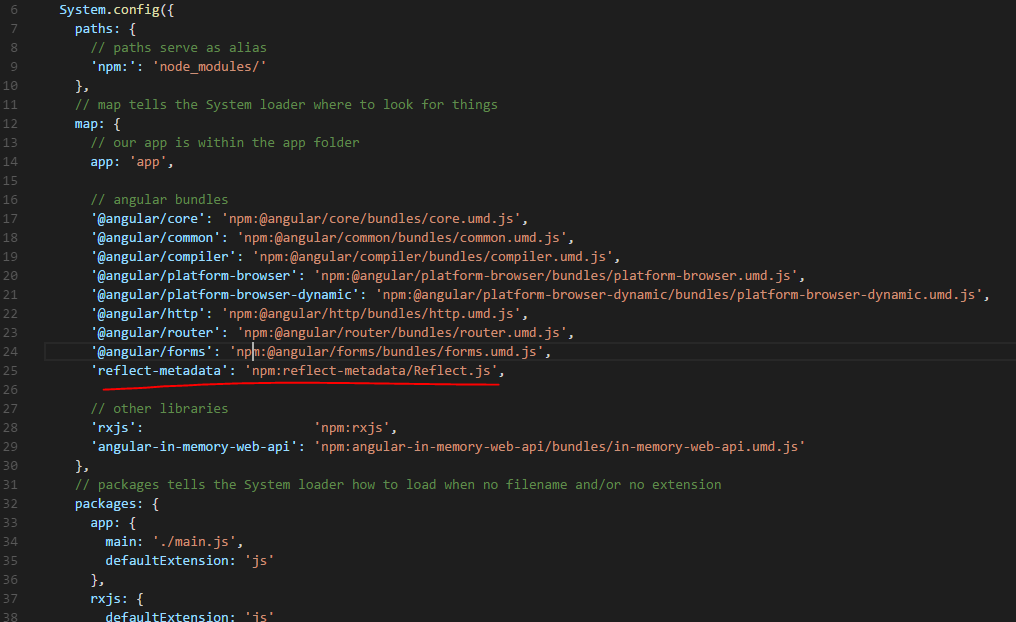更新 : 2019-07-11
"emitDecoratorMetadata": true
这个是 typescript 配合 metadata 的功能, 能过返回 类型, 比如 string, boolean 等.
不过也不是很准, 比如 string | null 这样它就 gg 了
然后它还有一些 bug
https://github.com/Microsoft/TypeScript/issues/19563
最近 ng 8 , 默认打包都会去 es6
如果类型有循环引用, 就会遇到 bug 了, es5 的情况下是 ok 的
感觉还是不要用这个为妙.
更新 : 2018-11-27
{ date: Date } 之前好像搞错了,这个是可以用 design:type 拿到的
{ date: Date | null } 任何类型一但配上了 | 就 design:type 就变成 object 了
{ arr : string[] } design:type = array
design:type 是可以被我们覆盖的. e.g.: Reflect.metadata('design:type', Date);
更新 : 2017-04-07
design.type 不可以反射出 Date 哦
{ date : Date } <-- 反射出来是 Object
{ resource : A } vs { resource = new A() } vs { resource : A = new A() }
第一和第三 ok, 第二不行哦 会反射不出 class A
refer : https://www.npmjs.com/package/reflect-metadata
refer : https://www.typescriptlang.org/docs/handbook/decorators.html
refer : http://blog.wolksoftware.com/decorators-metadata-reflection-in-typescript-from-novice-to-expert-part-4
Attribute 和 reflection 在写 ng2 时我们也会常用到.
熟悉静态语言的朋友应该都很习惯使用这 2 个东西了.
我说的 Attribute 是站在 c# 的角度看的。
前端更准确的说法是 decorator, annotations.
Attribute 主要的目的就是让我们为属性等打上一个标签, 然后通过反射获取来做逻辑.
写标签就大的好处是可读性高.
目前反射是靠 reflect-metadata 来完成的. angular 也使用它哦
example :
const RequiredSymbol = Symbol("RequiredSymbol");
class Required
{
}
function RequiredAttribute() {
return Reflect.metadata(RequiredSymbol, new Required() );
}
使用
class Person {
@RequiredAttribute()
@EmailAttribute()
email: string
}
我就是把他当 c# Attribute 来用的, 嘻嘻
反射
let person = new Person(); let keys = Reflect.getMetadataKeys(person, "email"); //获取所有的 Attribute let required: Required = Reflect.getMetadata(keys[1], person, "email"); //key[0] is "design:type" build in 的 let required2: Required = Reflect.getMetadata(RequiredSymbol, person, "email"); //get by symbol
注意 "design.type" 这个能获取到当前 property 的 type, 比如 String, Number, Product
这个 design.type 是自带的, 只要你使用了 decorator 就可以反射出类型, 很神奇哦!
比如你写一个 decorator type
@Type
product : Product
Type 什么都不做
function Type(target : any, key : string) { }
也是可以反射 "design.type" 出来
我目前只用到 property 的, 其它的以后再说.
如果你不喜欢每次都写括弧 @xx(), 这样写也是 ok 的.
let requriedSymbol = Symbol("required");
let required = Reflect.metadata(requriedSymbol,null); //直接把生成好的方法存起来使用
class Person {
@required
name: string
@required
age: number
}
let p = new Person();
let hasKey1 = Reflect.hasMetadata(requriedSymbol,p,"name");
let hasKey2 = Reflect.hasMetadata(requriedSymbol,p,"age");
一般上, 没有 import "reflect-metadata"; 的话, script 是照跑的. 不过有时候 typesciprt 会有 error ""

我也不知道为什么 ..
目前的解决方法是 import "reflect-metadata";
同时在 systemjs.config.js 里面加一个路径

有朋友知道原因的话,请告诉我哦,万分感激.
运用在 class 上
export const someSymbol = Symbol("someSymbol");
export function ComplexType(value : string) {
return Reflect.metadata(someSymbol, value);
}
@ComplexType("what ever")
class Person
{
}
let person = new Person();
let result = Reflect.getMetadata(someSymbol,(person as Object).constructor); //使用的是 constructro 哦
console.log(result); //what ever
循环应用的问题
refer module 循环依赖 : http://es6.ruanyifeng.com/#docs/module
由于 decorator 运行的早, 所以遇上 module 循环依赖时有时候会拿不到值
// Type.ts export function Type(type : any) { return Reflect.metadata("Type", type); } // product.model.ts import { Color } from "./color.model"; import { Type } from "./Type"; export class Product { @Type(Color) colors : Color[] } // color.model.ts import { Product } from "./product.model"; import { Type } from "./Type"; export class Color { @Type(Product) product : Product } // main.ts import { Color } from "./color.model"; import { Product } from "./product.model"; let product = new Product(); let color = new Color(); console.log( Reflect.getMetadata("Type",product,"colors" )); //undefined console.log( Reflect.getMetadata("Type",color,"product" )); //Product
解决方法就是把全部都写成方法,需要调用的时候才去拿
export function Type(valueMethod : any) { let cache : any = null; let method = ()=>{ if(cache) return cache; cache = valueMethod(); return cache; } return Reflect.metadata("Type", method); } @Type(() => Color) colors : Color[] @Type(() => Product) product : Product //调用方法获取 console.log( Reflect.getMetadata("Type",product,"colors" )() ); //color console.log( Reflect.getMetadata("Type",color,"product" )() ); //Product